Letters from Lodi
An insightful and objective look at viticulture and winemaking from the Lodi
Appellation and the growers and vintners behind these crafts. Told from the
perspective of multi-award winning wine journalist, Randy Caparoso.
Small scale independents working out of Lodi Crush produce exciting alternative style wines
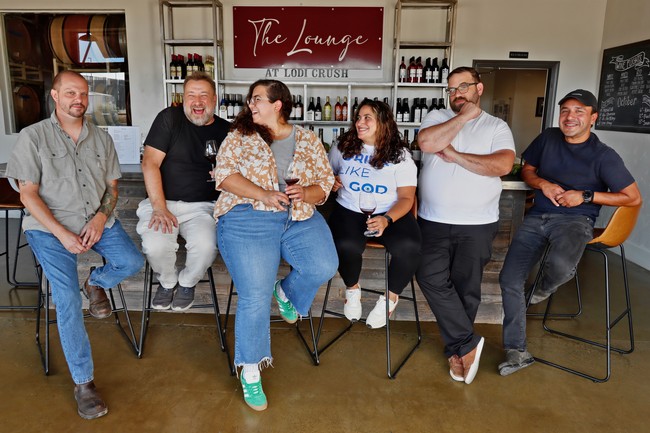
The line-up of minimal intervention, small, independent winemakers working out of Lodi Crush: from left, Adam Saake (Perch Wine Co.), Adam Sabelli-Frisch (Sabelli-Frisch), Rose Nemet (Kareen Wine), Terah Bajjalieh (Terah Wine Co.), Greg Nemet (Kareen Wine) and Gerardo Espinosa (Lodi Crush and Anaya Vineyards).
Lodi Crush has become a magnet for small, independent wine brands⏤primarily one- or two-person operations⏤who, almost as a rule, prefer minimal intervention, alternative style wines appealing to the growing minority of oenophiles who prefer less commercialized, almost raw tasting wines.
For the most part, this subset of handcraft artisans also look for grapes that are farmed in organic fashion. This approach to viticulture is all part of this growing culture⏤low intervention farming, after all, goes hand in hand with low intervention winemaking⏤which is also becoming increasingly important to consumers who specifically seek out products produced with some sense of environmental responsibility.
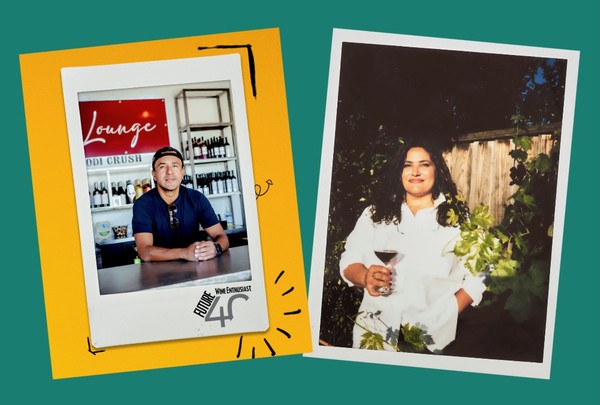
Wine Enthusiast photos of Lodi Crush's Gerardo Espinosa as well as Terah Wine Co.'s Terah Bajjalieh (who now makes wine at Lodi Crush), both recognized by the magazine in its list of 2024 "Future 40 Tastemakers." Wine Enthusiast.
The mind behind Lodi Crush is a local winemaker named Gerardo Espinosa, who was recently lauded by Wine Enthusiast as one of the magazine's 2024 "Future 40 Tastemakers." Citing Espinosa's work at Lodi Crush, which he operates as managing partner, the magazine wrote: "Espinosa has become a key figure in supporting Lodi's wine community and a push towards sustainable practices."
Lodi Crush was first established by Espinosa in 2016 as a custom crush winery—homes for small, independent vintners bereft of their own winemaking facilities. In addition, Espinosa has been producing wines sold under his own brand, Anaya Vineyards. All Anaya Vineyards wines are sourced from vineyards owned and farmed by his family (the Anayas) in Lodi's Clements Hills AVA.
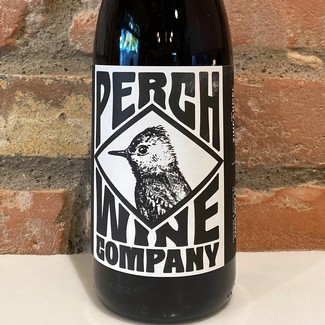
Bottling of one of Lodi Crush's small independent wine brands, Perch Wine Company.
Espinosa's custom crush business began on a modest scale, working out of a warehouse in the industrial area of Lodi, on the east side of Hwy. 99. In 2021 the business was moved into an old building on Downtown Lodi's E. Elm St., just east of the historic railroad tracks running through the center of town. Within a couple of years Espinosa was able to open up an adjoining wine bar called The Lounge at Lodi Crush, where guests can sit on sofas, bar stools or at a long table to enjoy the wines of Anaya Vineyards as well as that of other brands such as Seis Soles.
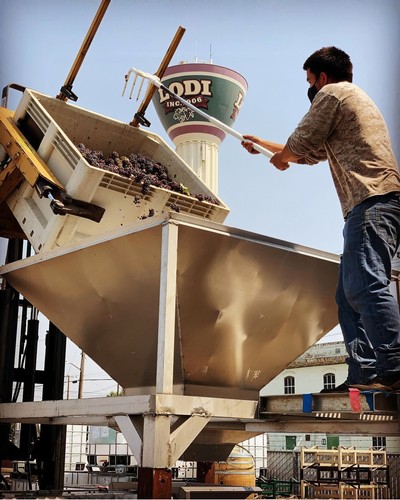
Incoming grapes at Lodi Crush in Downtown Lodi. Lodi Crush.
Still, when you go to The Lounge at Lodi Crush, it is mainly about the wine, not just the "scene" or the live entertainment frequently engaged by this cozy venue. Towards that end, Espinosa is currently working on featuring more wines handcrafted by his current line-up of in-house vintners. Until that happens, connoisseurs of these alternative style wines may procure these products by contacting each of the individual brands directly.
If, of course, you strongly support small, independent artisanal producers as a matter of principle, we strongly encourage you to look into these wines coming out of Lodi Crush. The more you do, the more you support the Lodi grape growing industry, particularly those veering more towards more organic, environmentally conscious viticulture.
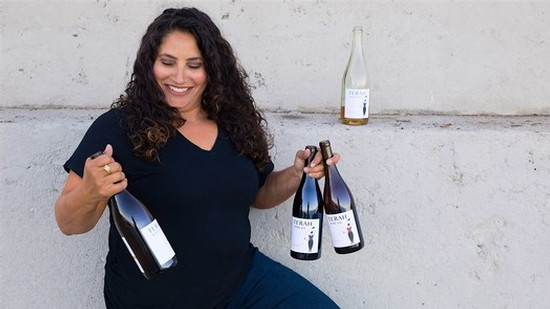
Terah Wine Co. owner/winemaker Terah Bajjalieh. Terah Wine Co.
A line-up of some of the outstanding bottlings by vintners currently housed in Lodi Crush, tasted just this past week with the winemakers themselves:
2023 Terah Wine Co., The Bench Vineyard Clements Hills-Lodi Vermentino ($28)⏤Terah Wine Co. is operated by a winemaker named Terah Bajjalieh, who has plied her craft in five countries since achieving her Master's in enology and viticulture in Montpellier, France. Which is to say, she produces extremely mindful wines laser focused on that classic objective, "sense of place." To that end, Bajjalieh has been working with Vino Farms' biodynamic certified vineyards since 2021. This bone dry white—actually produced and bottled by Bajjalieh at Les Lunes Wine in Richmond, CA—can be described as "texbook Vermentino." Meaning, the nose is an essence of lemon and tart apple mingling with floral and distinctly mineral sensations, all of which is manifested in a crisp, medium body (neither heavy nor light in the feel) driven by what Bajjalieh describes as a "savory, almost salty" sensory taste, screaming for practically any shellfish, be it as raw as the wine's intensity or as precisely prepared as the canny craftsmanship going into this wine.
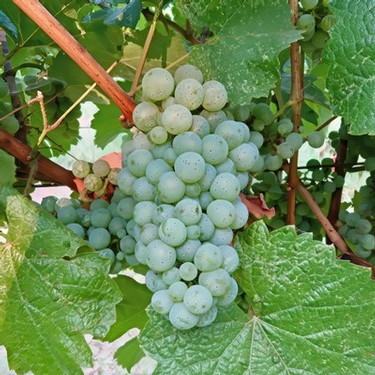
2024 Riesling in Lodi's Mokelumne Glen Vineyards.
2022 Sabelli-Frisch, "Bund" Mokelumne Glen Vineyards Mokelumne River-Lodi Riesling ($27)⏤Although owner/winemaker Adam Sabelli-Frisch admits "no one expects good Riesling to come out of Lodi," even the most discerning connoisseur of Riesling would have to admit that this steely dry iteration of the grape is more than good. The fragrance is redolent with fresh flower and citrus scents tinged with distinct notes of "petrol," the oil-like characteristic associated with great Rieslings grown all around the world, from Australia and South Africa to Germany and France. On the palate, the floral and citrus qualities are revved up by a lip smacking lemon acidity in a light-medium body (12.5% alcohol), giving a long, savory, mildly briny/minerally taste.
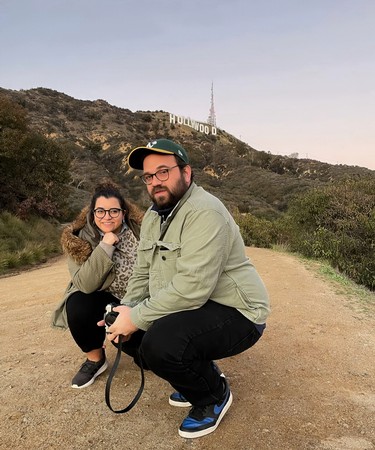
Kareen Wine's Rose and Greg Nemet. Kareen Wine.
2020 Kareen Wine, Lodi Viognier ($20)⏤From the get-go (since 2016), Kareen's sister/brother team of Rose and Greg Nemet have been all-in on Lodi grapes. In fact, true to their Armenian family roots, their Viognier⏤sourced from Ripken Vineyards (farmed by KG Vineyard Management) in the Delta area of the Lodi AVA⏤is, quite possibly, the most exotic, if not the most exuberant, expression of this varietal made in America, redolent with whiffs of wild honey, the kitchen scent of bouquet garni (i.e., bundled green herbs), wildflowers and salted golden raisins. On the palate, the body is medium-full (13.5% alcohol) yet restrained, the emphasis on a buoyant yet fleshy, rounded feel, and an uncompromising purity of the Lodi grown fruit (the wine is aged strictly in steel drums, no oak).

2023 Anaya Vineyards, Potrero Vineyard Clements Hills-Lodi Albariño ($32)⏤Understandably, when crafting his family grown Albariño⏤which has emerged as the signature varietal white of the Lodi appellation⏤Espinosa has endeavored to plot his own course through the crowded field. While his Albariño is barrel fermented with native yeast and aged 12 months in neutral French oak barrels (most Lodi Albariños never see a second in oak), it neither smells nor tastes "oaky," but rather, absorbs the lush creaminess possible in this approach to vinification. It also amplifies the peach-like side of the grape, a characteristic that is pungent in the wine's floral profile, and extends into a crisp, medium bodied (13.1% alcohol) feel on the palate.
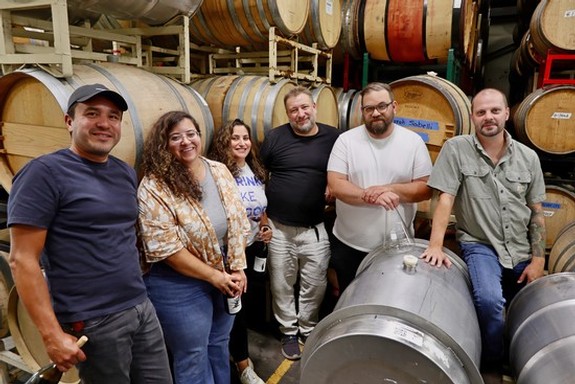
At Lodi Crush, from left: Gerardo Espinosa (Lodi Crush and Anaya Vineyards), Rose Nemet (Kareen Wine), Terah Bajjalieh (Terah Wine Co.), Adam Sabelli-Frisch (Sabelli-Frisch), Greg Nemet (Kareen Wine) and Adam Saake (Perch Wine Co.).
2022 Sabelli-Frisch, "Milk Fed 9" Somers Vineyard Mokelumne River-Lodi Mission Rosé ($27)⏤In previous vintages Sabelli-Frisch has produced red wines from the Mission grapes grown on (literally) gigantic grapevines in Somers Vineyard, located alongside the Mokelumne River on the east side of the appellation. He says, however, "I was always curious about how a dry rosé made from these grapes would turn out," citing the intensely aromatic "strawberry and herbal" varietal qualities characteristic of Mission from this vineyard. In this orangey pink colored wine, however, the strawberry is submerged by a grapefruit/blood orange-like fruit character, and the herbiness is more of cooking spice (clove, cardamom, peppercorn, mace, etc.) punctuating a crisp yet rounded, fleshy, medium bodied feel on the palate⏤all of the aforementioned allowed to flow effortlessly through the minimal intervention approach (the wine is native yeast fermented and aged briefly in neutral barrels) of the brand.
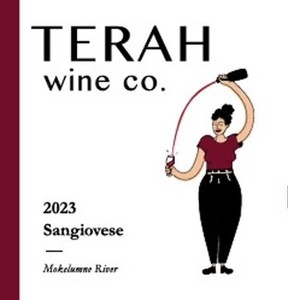
2023 Terah, River's Edge Vineyard Mokelumne River-Lodi Sangiovese ($32)⏤From another vineyard biodynamically farmed by Vino Farms and produced by Bajjalieh at Les Lunes Wine in the East Bay, where she applies her minimal intervention philosophy to capture the pure, acid driven character of this Italian grape⏤red berry/cherry fruit tinged with scrubby herbs, a touch of anise-like spice and, to boot, a sensual whiff of afternoon perspiration. The pervasive factor is that this red is completely unfettered by oak (aged strictly in neutral barrels), and was picked early enough (13.8% alcohol) to retain a bright, long, naturally zesty edginess on the palate.
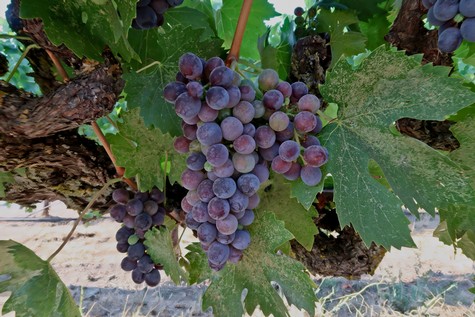
Biodynamically grown 2024 Sangiovese in Mokelumne River-Lodi's River's Edge Vineyard.
2022 Perch Wine Co., Lodi Kestrel Red ($25)⏤This independent label, started barely four years ago, has taken off and become an "in" brand among alternative wine lovers; not because it does anything out of the ordinary but because of the sheer skill of owner/winemaker Adam Saake. Case in point: This unerring blend of Lodi grown Carignan (mostly) with Zinfandel, Cinsaut and Petite Sirah (the latter grown by the Anaya family). It is a good example of why "natural" style winemaking⏤native yeast fermentation, no filtration, neutral barrels, et al.⏤ makes absolutely perfect sense: Everything about this wine is about beautifully bright, lush fruit, combining red and black berries with peppery spice and a touch of earthiness, long, rich and supple on the palate. Nothing "dirty" or even remotely "funky"⏤just a joyous celebration of sun kissed Lodi grown grapes.

Bechthold Vineyard Cinsaut, own-rooted grapevines planted in 1886.
2022 Kareen Wine, Bechthold Vineyard Lodi Cinsaut ($36)⏤A red wine made very true to its lineage⏤Lodi's oldest, and undoubtedly best known, ancient vine growth (own-rooted Cinsaut planted in 1886). The Cinsaut perfume (kitchen spice inundated berry/strawberry/rhubarb) soars from the glass⏤enriched by a whisper of vanillin oak (14 months in wood, primarily neutral, but 30% second-use barrels)⏤while the pillowy soft yet bright, zesty, juicy spiced berry qualities linger long and gently, mingling with the faintest touch of earthiness.
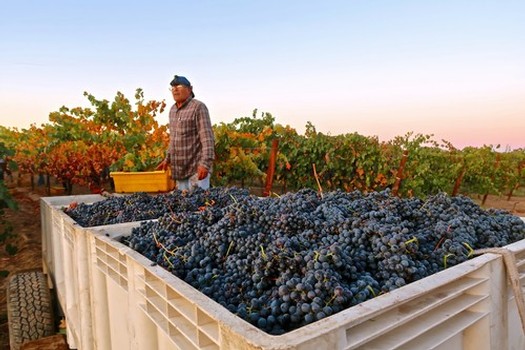
Clements Hills-Lodi Tempranillo harvest in the Anaya family's Potrero Vineyard.
2021 Anaya Vineyards, Potrero Vineyard Clements Hills-Lodi Semi-Carbonic Tempranillo ($36)⏤Like many Tempranillo based reds (the most famous of which are grown in Spain's Rioja region), the brick rimmed color and relative lightness of this wine (12.8% alcohol) belies an exuberant richness laden with ultra-fragrant wild berry-like fruit (strawberry/blackberry), coming across as zesty yet silken fine on the palate. While the wine exudes "drink-me-now" sighs and whispers, it is sturdy enough to hang with almost any red; particularly, of course, most Tempranillos of the world, which are typically more about feel than overtly aromatic intensity.
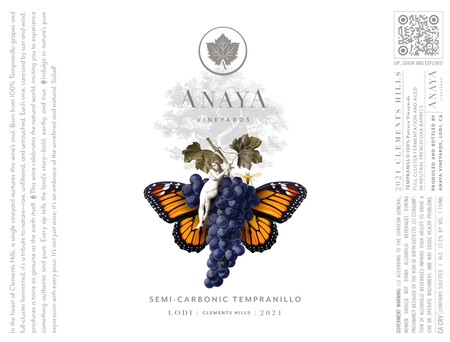
2023 Perch Wine Co., Mokelumne River-Lodi Zinfandel ($30)⏤When a vintner gets ahold of fruit from a tiny parcel of own-rooted Zinfandel planted more than 100 years ago, the old winemaker's adage automatically kicks in: Don't screw it up. Respect thy elders. Saake succeeds by coaxing out a deliriously perfumed, mega-intense black cherry profile, neatly wrapped in fleshy medium-full flavors (14.1% alcohol) that come across like pure and unadulterated velvet, the way Barbra Streisand is all about "butter." The vineyard, as it is, is located on the east side of Lodi tucked up against the Mokelumne River off Schmiedt Rd. (Saake and Tegan Passalacqua, who owns the neighboring Kirschenmann Vineyard, have been calling it "Kirschenmann House Block")⏤a rarified neighborhood for Californian ancient vines if there ever was one.
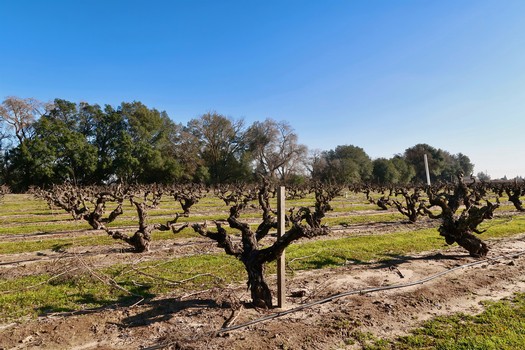
Own-rooted Zinfandel planted in the early 1900s along the Mokelumne River at Schmiedt Rd. on the east side of Lodi.
2023 Sabelli-Frisch, "Inedal" Jacob's Two Acres Vineyard Mokelumne River-Lodi Zinfandel ($32)⏤The cool thing about small independent producers is that they contribute to the interest in obscure blocks of old vines that would otherwise remain totally unknown: In this case, a 2-acre patch of own-rooted, old school furrow irrigated Zinfandel planted in the early 1960s by the grandfather of Lodi grower Chris Knoll. Sabelli-Frisch's feel for this vineyard⏤which naturally yields a gentle, fragrant red berry scented style of of the varietal (very typical of east side Lodi Zinfandels)⏤prompted him to ferment with 100% stem inclusion (added after destemming), giving the wine a peppery/herby dimension in the nose, and a sturdier medium body (13.5%) in the palate-feel. Add "Jacob's" to the list of Lodi vineyards to know, love and help preserve!
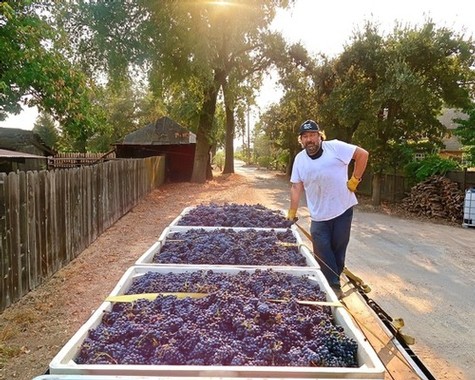
Adam Sabelli-Frisch harvesting grapes in Lodi's Mokelumne River AVA.
2023 Perch Wine Co., Viñedos Aurora Vineyard Clements Hills-Lodi Petite Sirah ($28)⏤From a vineyard owned and farmed by the Anaya family, this wine fulfills nearly all the reasons why Lodi growers first started planting in the reddish, rocky clay soils of Clements Hills in the first place⏤because there is more natural potential for enhanced phenolics (i.e., color and tannin) in black skinned grapes such as Petite Sirah. While Saake employs partial (50%) whole cluster in the fermentation⏤primarily to attain an herby dimension to enhance the ripe fruit and black pepper spice intrinsic in the varietal⏤he apparently didn't have to do too much more to achieve a compellingly vivid purplish black color, deeply concentrated aromas (herby/spicy black and blue berries) and a richly extracted yet round, svelte, long and fleshy feel. Well made wines don't really "make themselves," but when left well enough alone they can do the proverbial leap-tall-buildings-more-powerful-than-a-locomotive thing, with an intensity and finesse comparable to that of any other varietal wine in the world.
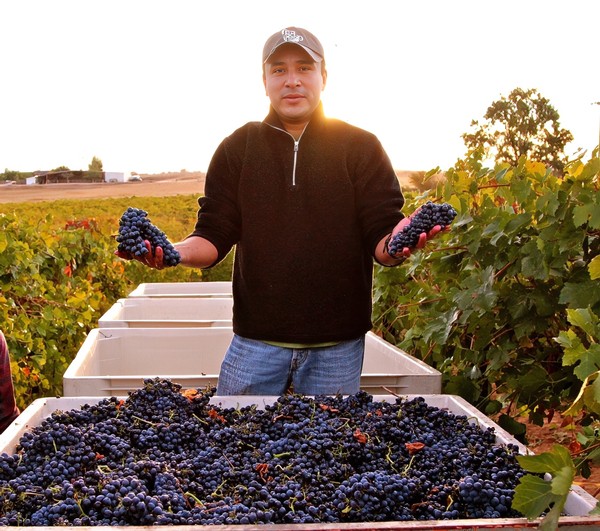
Gerardo Espinosa harvesting Petite Sirah in the Anaya family's Viñedos Aurora Vineyard in Lodi's Clements Hills AVA.